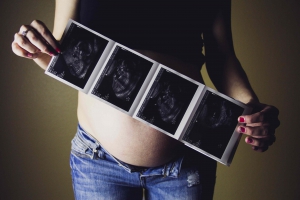Getting to know your baby before birth

You don’t need to wait until your baby is born to get to know them. Getting to know your baby can begin during your pregnancy or maybe even before conception. Your relationship with your baby, like all relationships, needs nurturing. As baby is growing in your womb you may feel that you are gradually getting to know them better.
The early relationship you, your partner and family have with your baby is so important. This is as true before they are born as when they arrive.
The development of your baby’s brain begins from conception, before you even know you are pregnant. By week 8, electrical activity begins in the brain allowing your baby to co-ordinate their first (spontaneous) movements that can be seen on an ultrasound scan. Brain cells begin sending messages to each other and by the 18th week of pregnancy, your baby will have developed between one to two billion brain cells. During the last three months of pregnancy and the first two years of life, your baby’s brain develops rapidly.
Its never too early to start talking and singing to your baby and sharing stories.
The connections that are formed in the brain before the birth include baby’s hearing. Your baby can hear sounds from at least 18 weeks, and maybe even earlier. At first the baby hears sounds in your body, tummy gurgling and your heartbeat. At around 26 weeks babies in the womb can recognise mum’s voice but will recognise other voices that they hear frequently too. dad, siblings. Babies after birth will turn to the sound of their parent’s voice in preference to that of a stranger. From the moment that they are born, they will want to communicate with you. It is good to try to understand how your baby might be feeling.
Talking to your baby while pregnant is an important part of developing a relationship with them and helps them to bond with you. Thinking of them like a little person. Getting to know your voice makes them feel safe and secure and helps their development. After 32 weeks your baby may start to recognise certain vowel sounds from your language. Some research suggests that very early language development may begin before birth.
Find a quiet time when you and your baby can focus on each other and use a tuneful sing song voice. It doesn’t matter what music or song – if you like it so will your baby.
If you can’t think of anything to say, just start with a chat to your baby about your day or tell a story or a short children’s nursery rhyme. Rhythm and rhyme are easy for your baby to hear. You could read your favourite book or a magazine. Try calming stories when your baby is quiet or bedtime. Say goodnight before you go to bed and hello when you wake up.
Keep it going after your baby’s birth. Babies remember what they hear in the womb and hearing something familiar can be soothing.
Not everyone feels comfortable talking to their bump, however. Everyone’s different.
Feeling your baby.
During pregnancy you may start to recognise that your baby may be responding to your own movements or your mood. Baby may become active when certain music is played or hears your voice. Tune in to what your baby is responding to and to what your baby may be trying to tell you. Give yourself time to reflect, be still in the moment, go for a walk or have a warm bath and think about the baby. You may like to write a diary or stories to the baby about what you are experiencing.
Your baby is protected and nestled inside you, warm and cosy, hearing your heartbeat, getting constant nourishment from your placenta and able to reach out and touch themselves and you. Feel the baby by placing your hands on your abdomen and rest your hands quietly, feeling the baby move and kick. Gently stoke and rub your tummy and feel your baby respond. Dads can enjoy this too if it feels comfortable.
Having an ultrasound scan during pregnancy.
Seeing your baby via ultrasound scan particularly in the early weeks before you can feel any movement can reassure you that baby exists can increase the feeling that baby is real. Seeing your baby, often leaping about inside the womb for the very first time can be a very reassuring experience. ‘Seeing is believing’ and the reality of a baby coming is reaffirmed. Often it is not until after the first scan that new parents share their exciting news with family and friends as they feel reassured, and they start to connect to their baby.
Have an ultrasound photograph that you can keep close and look at when you want to share a moment with your baby. Dads too might like to carry a picture of the ultrasound to feel connected to baby.
Getting to know your baby after birth.
We have all heard of ‘skin to skin’ and the high levels of oxytocin that happen right after birth. This encourages bonding and attachment to your baby. The new baby knows mum, recognises her smell, her heartbeat, even taste through the amniotic fluid. A mother and baby communicate with each other using sight, sound, and touch. Some new mums don’t experience this fully right away as they can feel exhausted or overwhelmed or feel concerned about their baby’s health. It is always good to remember that bonding and attachment evolve, and you can always revisit skin to skin – As you care for baby, just holding them, feeding them or nappy changing caring for your baby and being their primary care giver comforts them. All these activities help you both to connect to each other. Your baby needs you and you need them.
Bonding with your baby is likened to building a brick wall. To make a strong wall you build a good foundation with you as their mother being the primary care giver for your baby. Then you lay the bricks with the cement of love. This holds everything else together and makes the wall strong. The bricks are the activities that make a growing baby happy, healthy, and safe. The bricks are the kisses, warmth, good food, warmth, a safe home, talks, cuddles, clean clothes, clean nappies, laughs, stories, medical check-ups, bedtimes, playtimes, rules and attention.
Talk to someone about your feelings and ask questions when you see your maternity or postnatal team. Try to increase your support network and meet other expectant and new mums to share your experiences. Try to look after your own health and wellbeing, and make sure you get enough rest and relaxation.




